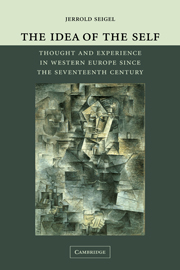Book contents
- Frontmatter
- Contents
- Acknowledgments
- PART I INTRODUCTORY
- PART II BRITISH MODERNITY
- PART III SOCIETY AND SELF-KNOWLEDGE: FRANCE FROM OLD REGIME TO RESTORATION
- PART IV THE WORLD AND THE SELF IN GERMAN IDEALISM
- PART V MODERN VISIONS AND ILLUSIONS
- 13 Dejection, insight, and self-making: Coleridge and Mill
- 14 From cultivated subjectivity to the culte du moi: polarities of self-formation in nineteenth-century France
- 15 Society and selfhood reconciled: Janet, Fouillé, and Bergson
- 16 Will, reflection, and self-overcoming: Schopenhauer and Nietzsche
- 17 Being and transcendence: Heidegger
- 18 Deaths and transfigurations of the self: Foucault and Derrida
- 19 Epilogue
- Notes
- Index
16 - Will, reflection, and self-overcoming: Schopenhauer and Nietzsche
Published online by Cambridge University Press: 05 June 2012
- Frontmatter
- Contents
- Acknowledgments
- PART I INTRODUCTORY
- PART II BRITISH MODERNITY
- PART III SOCIETY AND SELF-KNOWLEDGE: FRANCE FROM OLD REGIME TO RESTORATION
- PART IV THE WORLD AND THE SELF IN GERMAN IDEALISM
- PART V MODERN VISIONS AND ILLUSIONS
- 13 Dejection, insight, and self-making: Coleridge and Mill
- 14 From cultivated subjectivity to the culte du moi: polarities of self-formation in nineteenth-century France
- 15 Society and selfhood reconciled: Janet, Fouillé, and Bergson
- 16 Will, reflection, and self-overcoming: Schopenhauer and Nietzsche
- 17 Being and transcendence: Heidegger
- 18 Deaths and transfigurations of the self: Foucault and Derrida
- 19 Epilogue
- Notes
- Index
Summary
Probably no nineteenth-century thinker or writer has shaped contemporary discussions of selfhood more than Friedrich Nietzsche. Nietzsche has attracted followers (as well as enemies and critics) for varied reasons, but many who declare themselves his disciples emphasize his pioneering and sharp criticism of traditional notions about the self, his powerful denials that the ego is or can be coherent or stable, and that human beings should be regarded as “subjects” in the senses presumed by science, morality, or citizenship. Nietzsche's powerful rejection of such views has provided much ammunition and inspiration for later thinkers who have found reason to announce or welcome the death of the self, the author, or the subject.
Nietzsche's attack on the idea that ordinary individuals possess coherence or autonomy did not issue in a declaration of human weakness. Quite the contrary, his whole intellectual project was carried out on behalf of a search for hidden sources of vitality and strength; these he sought to uncover so that they could nurture a new and higher type of humanity, which he named “the strong,” “the free spirits,” or most famously the Übermensch or overman. The life of impotence, sickness, and decay to which most people were condemned belonged to a world where ordinary and traditional ideas about the self reigned, notions inherited from religious ideas about the soul or rooted in scientific conceptions that attributed regularity and causal order to the universe and its contents.
- Type
- Chapter
- Information
- The Idea of the SelfThought and Experience in Western Europe since the Seventeenth Century, pp. 537 - 567Publisher: Cambridge University PressPrint publication year: 2005

